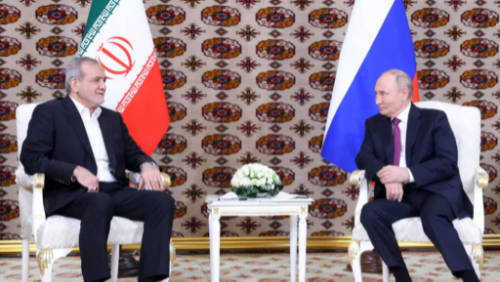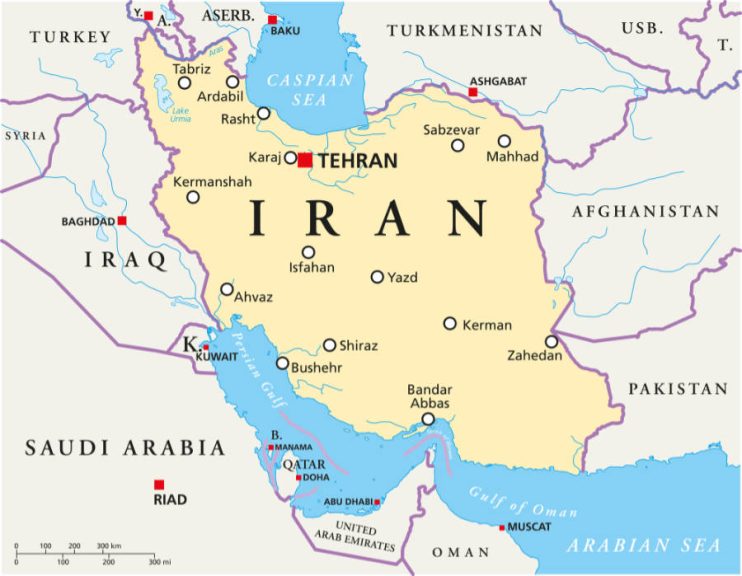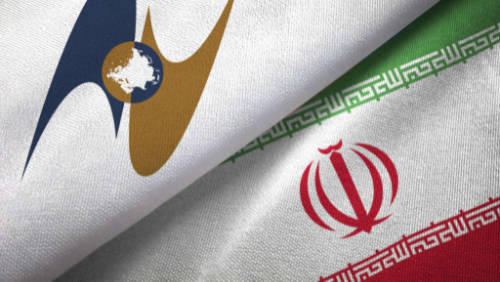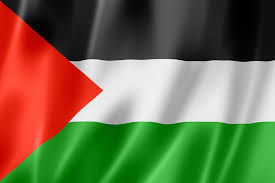The Iranian Foreign Minister, Abbas Araghchi has been visiting Moscow and has met with both President Putin and Russia’s Foreign Minister, Sergey Lavrov. Apart from mediating in the proposed United States-Iran nuclear agreement, the two sides also held extensive discussions concerning Russia-Iran bilateral relations. Following these, Lavrov held a press conference to describe the latest agreements between them. Detailed were the Russia-Iran Strategic Partnership, the EAEU-Iran Free Trade Agreement, Bilateral Trade, Tourism, Infrastructure, the BRICS and SCO, the mutual relationship with the United Nations, Palestine and Syria and Iran’s nuclear programme.
The following are excerpts of Sergey Lavrov’s speech and his answers to the media’s questions, structured according to the topics set out below. The full transcript of the press conference is available on the website of the Russian Foreign Ministry
Overview

“We have engaged in comprehensive discussions with Abbas Araghchi, the Foreign Minister of Iran. These talks reaffirmed our commitment to achieving further positive outcomes in our bilateral relations and international collaboration, building upon the agreements reached by our Presidents and in light of my visit to Tehran in February of this year.
Our joint assessment is that Russian-Iranian relations are of a distinctive nature, fully aligned with the spirit of comprehensive strategic partnership. These bonds continue to develop dynamically, despite the complex regional and global situation, as well as attempts to exert pressure on our nations in order to hinder the development of both Iran and Russia.”
Strategic Partnership

“On April 8, 2025, the State Duma ratified the Treaty on Comprehensive Strategic Partnership between Russia and Iran. This treaty was signed during the official visit of President Masoud Pezeshkian to the Russian Federation in January 2025, and on April 16, 2025, the Federal Council approved the ratification law. We are confident that the enactment of this historic document will have a positive impact on our collaboration across all spheres, both bilaterally and on the international stage.
Our political dialogue remains highly active. Recently, our Presidents have met on three occasions: in Ashgabat on October 11, 2024, at the Interconnection of Times and Civilisations International Forum; in Kazan on October 23, 2024, on the sidelines of the BRICS Summit; and on January 17, 2025, during the official visit of President Pezeshkian to Russia.
Today, as a follow-up to the meeting at the Kremlin yesterday, where President Putin also received Minister Araghchi, we focused on a range of specific issues on the international agenda and discussed bilateral matters in greater detail, particularly in the realm of trade and economic cooperation.”
Tourism

Q: “The leadership of both countries had said that our countries had reached the level of strategic partnership. How is the work progressing to simplify visa requirements for tourists and other categories of travellers?”
Lavrov: “Iran is one of the many countries included on the electronic visa list that was introduced last year. This is the most simplified procedure. In addition, we are now taking additional steps with regard to a number of documents in order to fully exempt embassy staff, both diplomats and holders of service passports, from visa requirements. The draft agreement on visa-free tourist travel for citizens of Russia and Iran is nearly complete.”

Bilateral Trade

“Our trade turnover has demonstrated positive growth. By the end of last year, it increased by more than 13%, nearly matching the record figures of 2022 (approximately US$5 billion). This upward trend continues despite severe sanctions imposed by the West against Russia and Iran.”
INSTC

“We reviewed the preparations for the upcoming 18th meeting of the Intergovernmental Commission on Trade and Economic Cooperation, which will take place here in Moscow from April 23 to 25, 2025. Key topics for discussion include bilateral infrastructure, logistics, and investment cooperation, particularly the implementation of the flagship project to construct the Bushehr Nuclear Power Plant and the Rasht-Astara railway section, financed through a Russian loan as part of the International North-South Transport Corridor. This corridor will play a pivotal role in significantly expanding trade, economic, and other ties across our shared region.”
Free Trade Agreement

“We agreed to expedite the implementation of existing agreements to create the necessary conditions for the effective and comprehensive realisation of these projects. We also endorsed the further intensification of business ties. We are confident that the Free Trade Agreement between the Eurasian Economic Union and Iran, which will enter into force on May 15, 2025, will facilitate the expansion of trade turnover and the simplification of mutual trade procedures.”
United Nations

“We engaged in a constructive discussion of pressing international issues. We are of one mind when it comes to the importance for all countries to respect international law, primarily, the principles of the UN Charter in their entirety and interrelation, rather than selectively, as our Western “colleagues” often do.
We have a vested interest in strengthening the Group of Friends in Defence of the UN Charter which was established in 2021 and is drafting policy papers and circulating them in the General Assembly and other UN bodies.
Countering illegal, destructive, unilateral, and coercive restrictions was among the priorities that we discussed today. These restrictions cause more harm to the countries that levy them, and international trade, than they do to the countries on the receiving end, because they sharply limit competition and all other principles underlying the WTO and other entities serving the global economy.
We agreed to continue substantive work on these issues. In addition to counteraction at the political level within the UN and other multilateral platforms, we will continue to apply bilateral efforts in order to taper off the effect of these illegal sanctions to zero. We are fully confident that we will be able to accomplish this.”
BRICS / SCO

“We agreed to step up cooperation at the SCO and BRICS.”
Note: Iran is a full member of the BRICS group, which includes other full members Brazil, Russia, India, China, South Africa, Egypt, Ethiopia, Indonesia and the UAE. Partner states include Belarus, Bolivia, Cuba, Kazakhstan, Malaysia, Nigeria, Thailand, Uganda and Uzbekistan. Algeria, Turkiye and Vietnam are in the process of joining but have not yet ratified their agreements. Ten of these nations are Islamic.
Iran is also a full member of the Shanghai Cooperation Organisation, which aims to strengthen stability and security, fight terrorism, develop economic cooperation, energy partnership, scientific and cultural interaction. Full members of the SCO are China, India, Kazakhstan, Kyrgyzstan, Pakistan, Russia, Tajikistan, Iran and Uzbekistan; Afghanistan, Belarus and Mongolia are observer countries; Armenia, Azerbaijan, Bahrain, Cambodia, Cambodia, Egypt, Kuwait, Maldives, Myanmar, Nepal, Qatar, Saudi Arabia, Sri Lanka, Turkey and the UAE are SCO dialogue partners. Sixteen of these countries are Islamic and seven of them are located in the Middle East.
Palestine & Syria

“We have coordinated our strategies with regard to other matters of international politics, including the situation in the Palestinian territories, which is a matter of deep concern, as well as the developments in Syria after the change of government in December 2024, and in the Middle East in general. We continue cooperating as part of the Caspian Five and on South Caucasus issues.
Iranian Nuclear Programme

“We had a substantive discussion of the Joint Comprehensive Plan of Action on the nuclear programme of Iran. We both believe that Washington scuttling this plan in 2019 marred the general atmosphere of the talks. Nevertheless, we welcomed the push to reach objective and mutually acceptable agreements, including the ones that have been and continue to be discussed by Iran and the United States. Russia is willing to facilitate this process and will support in every possible way the agreements that factor in the legitimate interests of Iran.”
Q: “On April 19, indirect talks between the delegations of Iran and the United States will take place in Rome. We have spotted mixed signals coming from the United States. Do you think the Americans are genuinely willing to come to terms?
The US media reported some time ago that President Trump had asked President Vladimir Putin to mediate negotiations with Iran. Is this request being reviewed and what format of the deal does Moscow see as the most acceptable to ensure security in the region?”
Lavrov: “I noted in my opening remarks that we are prepared to help, to mediate, and to play any role that will be useful and acceptable to the United States from Iran’s point of view.
We believe that an agreement focusing exclusively on nuclear matters is the way forward if we want to reach an agreement. Notably, Iran is willing to look for an agreement as part of the Treaty on the Non-Proliferation of Nuclear Weapons. This is a matter of principle that must be taken into account by those who are trying to saddle the talks with non-nuclear issues and thus create a situation that is fraught with risks.”
I believe our talks were productive and held on time. We will continue to carry out the principled agreements reached by our respective presidents and to maintain constant contact.”
For further updates on Russia-Iran trade and development, please visit our Russia-Iran archives here.
Further Reading

 Русский
Русский














